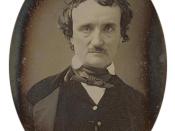"The Tell-Tale Heart"
Insane
adj 1: afflicted with or characteristic of mental derangement; "was declared insane"; "insane laughter" [ant: sane] 2: very foolish; "harebrained ideas"; "took insane risks behind the wheel"; "a completely mad scheme to build a bridge between two mountains" [syn: harebrained, mad] (Dictionary)
There are numerous ways to prove that a person is insane, and "The Tell-Tale Heart" is only one of them. But Edgar Allan Poe's short story "The Tell-Tale Heart" really shows what makes a person insane.
The Narrator's obsession with letting the reader know that he is not insane only adds to the fact that he is (SSFS 346). "You fancy me mad. Madmen knew nothing. But you should have seen me. You should have seen how wisely I proceeded..."(Poe 16). The Narrator is convinced he is sane by describing in detail his plans to kill the old man. "True! -nervous -very, very dreadfully nervous I had been and am; but why will you say that I am mad?"(Poe 13) This first line of the story lets the reader know right off the bat that the Narrator is "not" insane.
Not only does this add to the fact that he is insane, but it is also ironic.
There is more irony in the Narrator's insanity as well. It is ironic that, although insane, he spends so much time planning out every little detail of the old man's murder (Internet). Most people would think that if the Narrator were truly insane, he would have just gone and killed him, with no preparation. Yet more evidence proving the Narrator's insanity is that he drove himself into confessing the murder by believing that the heartbeat he heard was the old man's, not his own (Internet). That right there is evidence enough to prove the Narrator's...


